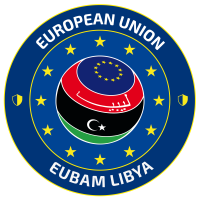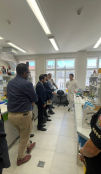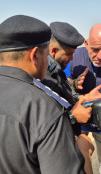Mission Member Profile: Communication and Information Systems Officer, Niko Vuorenmaa

Niko Vuorenmaa is a Finnish citizen and works in the Communication and Information Systems Unit. He joined the Mission in March 2018. Previously he worked at the Ministry of Justice. He has also served in EUBAM-Rafah in the Palestinian territories.
1.Why did you apply to the Mission?
I applied to the European Union Border Assistant Mission for several reasons:
I am genuinely committed to supporting and contributing to the objectives of the European Union Border Assistant Mission. I firmly believe in the importance of secure borders and effective border management for the safety and well-being of individuals and communities.
The Mission presents a unique opportunity for me to enhance my professional skills and broaden my expertise in communication and information systems within the context of border management. I am eager to face the challenges that arise in such a dynamic and complex environment, as it will enable me to develop professionally and make a meaningful impact.
Joining the Mission allows me to work in a collaborative and multicultural environment, where I can interact with professionals from various backgrounds and countries. This diversity fosters creativity, innovation, and a broader perspective, enabling me to learn from others and contribute my knowledge and skills to the collective effort.
2. What is your role within the Mission?
As a Communication and Information Systems Officer within the European Union Border Assistant Mission, my role encompasses a range of responsibilities that contribute to the effective management of communication and information systems. Some key aspects of my role include:
I am responsible for overseeing the design, implementation, and maintenance of communication and information systems within the Mission. This involves ensuring the smooth operation of networks, infrastructure, and software applications to support the Mission's activities.
I play a crucial role in maintaining the security and integrity of the Mission's information systems. This involves implementing robust security measures, monitoring network activity, and identifying and mitigating potential cybersecurity risks to protect sensitive data and prevent unauthorized access.
Overall, my role as a Communication and Information Systems Officer is to ensure the reliable, secure, and efficient functioning of communication and information systems within the European Union Border Assistant Mission. By fulfilling these responsibilities, I contribute to the Mission's overarching objectives of promoting border security, facilitating effective information exchange, and supporting the operational success of the organization.
3. Who do you work closely with?
As part of the Mission Support Department, I work closely with Finance-, Logistics-, HR units. However, the closest colleagues for me would be the colleagues under my unit with whom I have had the privilege to work for several years.
4. What do you enjoy most about your job?
Working in a multinational and diverse environment provides me with the opportunity to collaborate with colleagues from various backgrounds and areas of expertise. I enjoy the teamwork and camaraderie that comes with collaborating on projects, sharing knowledge, and learning from others. This collaborative spirit fosters a stimulating work environment and allows me to broaden my perspectives and skills. The field of communication and information systems is constantly evolving, presenting me with continuous learning opportunities. I embrace the chance to stay updated with the latest technologies, industry trends, and best practices. This continuous learning not only helps me excel in my current role but also contributes to my overall professional growth and opens up possibilities for future career advancement.
5. How do you like living in Libya and especially in Palm City?
Living in Libya, in a closed compound, can be a challenging experience, especially during times of conflict. However, I was able to maintain mentally strong and constantly kept improving my physical health, which in the end was my key element to overcoming challenges. Living in a compound had the effect of bringing colleagues closer as well, therefore we had several activities to make our presence more suitable.
6. What do you like to do in your leisure time?
My leisure time consisted of Ping pong, Swimming, Gym, Family calls, and/or just relaxing.
7. How would you describe your Libyan colleagues?
They were all very welcoming, friendly, and hard-working, which was one of the reasons for my stay on the mission for this long period.
8. What is your dream holiday destination?
Nothing specific on my mind, as long as there is sun and a beach with crystal clear water, I would be happy.
9. What is one of your favorite books?
“The Power of Awareness” by Neville Goddard.
10. From your previous experience, what advice would you give your colleagues and friends about mission life?
Working in a mission environment often involves collaborating with colleagues from different cultural backgrounds. Embrace this diversity and view it as an opportunity to learn from others, appreciate different perspectives, and foster an inclusive and respectful work atmosphere.
Mission life can be dynamic and unpredictable. It is essential to be flexible and adaptable to changing circumstances, as well as to be open to taking on new responsibilities or adjusting existing ones. This flexibility will enable you to navigate challenges effectively and contribute to overall success.
Mission work can present challenges and setbacks. Maintaining a positive mindset and a solution-oriented approach can make a significant difference. Focus on the positive aspects of your work, celebrate achievements, and view obstacles as opportunities for growth and improvement. A positive mindset contributes to resilience and helps create a supportive and motivating work environment.
Remember that each mission experience is unique, and the advice provided may vary depending on the specific context. However, incorporating these general principles can help you to navigate mission life more effectively and derive greater satisfaction from your experiences.





